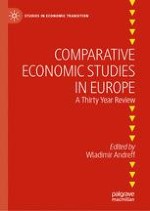2021 | OriginalPaper | Buchkapitel
Introducing Hard Budget Constraints Without Restricting Entrepreneurs: The Role of Voluntary Agreements in UEFA’s Club Licensing and Financial Fair Play Regulations
verfasst von : Egon Franck
Erschienen in: Comparative Economic Studies in Europe
Verlag: Springer International Publishing
Aktivieren Sie unsere intelligente Suche, um passende Fachinhalte oder Patente zu finden.
Wählen Sie Textabschnitte aus um mit Künstlicher Intelligenz passenden Patente zu finden. powered by
Markieren Sie Textabschnitte, um KI-gestützt weitere passende Inhalte zu finden. powered by
